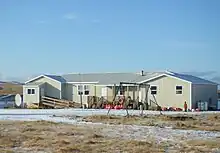| Aleutian Region School District | |
|---|---|
| Address | |
118 East International Airport Road
Anchorage , Alaska, 99518United States | |
| District information | |
| Type | Public |
| Grades | K–12[1] |
| NCES District ID | 0200010[1] |
| Students and staff | |
| Students | 25[1] |
| Teachers | 4.0[1] |
| Staff | 2.61[1] |
| Student–teacher ratio | 6.25[1] |
| Other information | |
| Website | www |
Aleutian Region School District (ARSD; REAA #8) is a school district headquartered in Anchorage, Alaska.[2] It serves the Aleutian Islands west of Unalaska,[3][4] including Adak, Atka, and Nikolski.[5] ARSD is the school district in the United States that is both the farthest east and the farthest west.[3] Several uninhabited islands, including Attu and Shemya, are within the district's physical boundaries.[6]
History
Previously areas of the Unorganized Borough were served by schools directly operated by the Alaska Department of Education and by Bureau of Indian Affairs (BIA) schools.[7] This included all areas of the Aleutian Islands not located in any city.[3] The state schools were transferred to the Alaska State-Operated School System (SOS) after the Alaska Legislature created it in 1971; that agency was terminated in 1975, with its schools transferred to the newly created Alaska Unorganized Borough School District, which was broken apart into twenty-one school districts the following year.[7] At that time the Alaska Legislature created the ARSD.[3]
Previously the district's mailing address was to Unalaska,[8] where its headquarters was designated.[9] Aleutian Region had been contracting administrative services from the Unalaska City School District, using the superintendent as its superintendent. Around 1999 the Anchorage company Education Resources Inc. began providing administrative services to Aleutian Region; the district switched because Unalaska City decided to not continue providing administrative services to Aleutian Region.[10]
Schools

It operates two schools: Adak School and Yakov E. Netsvetov School in Atka.
Adak was served by the Adak Region School District until it closed in June 1996.[11]
ARSD formerly operated the Nikolski School. The school was constructed in 1939 by the Bureau of Indian Affairs.[12] Schools in rural Alaska must have at least 10 students to retain funding from the state. For the 2009–2010 school year, however, Nikolski School had only nine students. This threatened the school's existence,[12][13] and it closed after the conclusion of the 2009–2010 school year.[14]
The district previously operated schools in Akutan, Cold Bay, False Pass, Nelson Lagoon, Sand Point, and Squaw Harbor.[15] Several of these areas are now a part of the Aleutians East Borough School District.
Demographics
In 2014 the Adak School had 25 students.[16]
In 1999 the district had 50 students in three schools.[10]
Circa October 1978 the district had 252 students. At the time the Akutan School had 12 students, the Atka School had 22 students, the Cold Bay school had 37 students, the False Pass school had 8 students, the Nelson Lagoon school had 18 students, the Nikolski school had 15 students, the Sand Point school had 136 students, and the Squaw Valley School had 4 students.[17]
Circa October 1978 the district had three teachers/specialists who rotated through very rural islands. That year Sand Point school itself had 13 teachers. There were two teachers each at the schools in Atka, Cold Bay, and Nelson Lagoon. The others each had a single teacher.[15]
References
- 1 2 3 4 5 6 "Search for Public School Districts – District Detail for Aleutian Region School District". National Center for Education Statistics. Institute of Education Sciences. Retrieved March 5, 2022.
- ↑ "District Contacts." Aleutian Region School District. Retrieved on February 13, 2017. "Physical Address 118 E International Airport Road, Suite B Anchorage, AK 99518"
- 1 2 3 4 "Aleutian.Region.School.District_032212.pdf." Aleutian Region School District. Retrieved on February 20, 2017. Posted at the Alaska House of Representatives Majority website.
- ↑ Map of School Districts. State of Alaska. Retrieved on February 20, 2017.
- ↑ "About Us." Aleutian Region School District. Retrieved on February 13, 2017.
- ↑ "Map of the Alaska School Districts (2013)." Alaska Department of Education. Retrieved on March 12, 2017.
- 1 2 Barnhardt, Carol. "Historical Status of Elementary Schools in Rural Alaskan Communities 1867-1980." Alaska Native Knowledge Network (ANKN), University of Alaska Fairbanks. Retrieved on March 13, 2017.
- ↑ "Alaska Education Directory, School Year 1999-2000." Alaska Department of Education. p. 3 (PDF p. 9/58). Retrieved on February 20, 2017. Available at ERIC (info in the ERIC PDF is on PDF p. 8/58).
- ↑ Fried, Neal and Brigitta Windisch-Cole. "Public School Education: A Big Industry." Alaska Economic Trends. February 1998. Start: p. 2/17. CITED: p. 7/17. "Name of District[...]Aleutian Region District School Center[...]Location of Headquarters of District Office[...]Unalaska"
- 1 2 Shinohara, Rosemary (July 13, 1999). "Private Firm Runs Schools - Rural Districts Try New Management". Anchorage Daily News. p. A1.
- ↑ "Alaska School and District Information." Alaska Department of Education. December 19, 2000. Retrieved on February 20, 2017.
- 1 2 Yardley, William (November 25, 2009). "Alaska's Rural Schools Fight Off Extinction". The New York Times. Retrieved May 20, 2010.
- ↑ Olsen, Erik (November 25, 2009). "An Alaskan Village in Crisis". The New York Times. Archived from the original on June 25, 2012. Retrieved February 13, 2017.
- ↑ "Nikolski School Information." Aleutian Region School District. Retrieved on February 13, 2017.
- 1 2 Aleutian Islands, Aleutian Peninsula Debris Removal: Environmental Impact Statement. United States Army Corps of Engineers, 1980. p. 58.
- ↑ "Super Seabirds, Super Kids! Archived December 2, 2016, at the Wayback Machine." The Adak Eagle's Call. Volume 3, Issue 4, May 2014. p. 3/3. Retrieved on March 15, 2017.
- ↑ Aleutian Islands, Aleutian Peninsula Debris Removal: Environmental Impact Statement. United States Army Corps of Engineers, 1980. p. 59.
External links
- Official website
- Aleutian Region School District at the Wayback Machine (archive index)
- Profile from the Alaska Department of Education